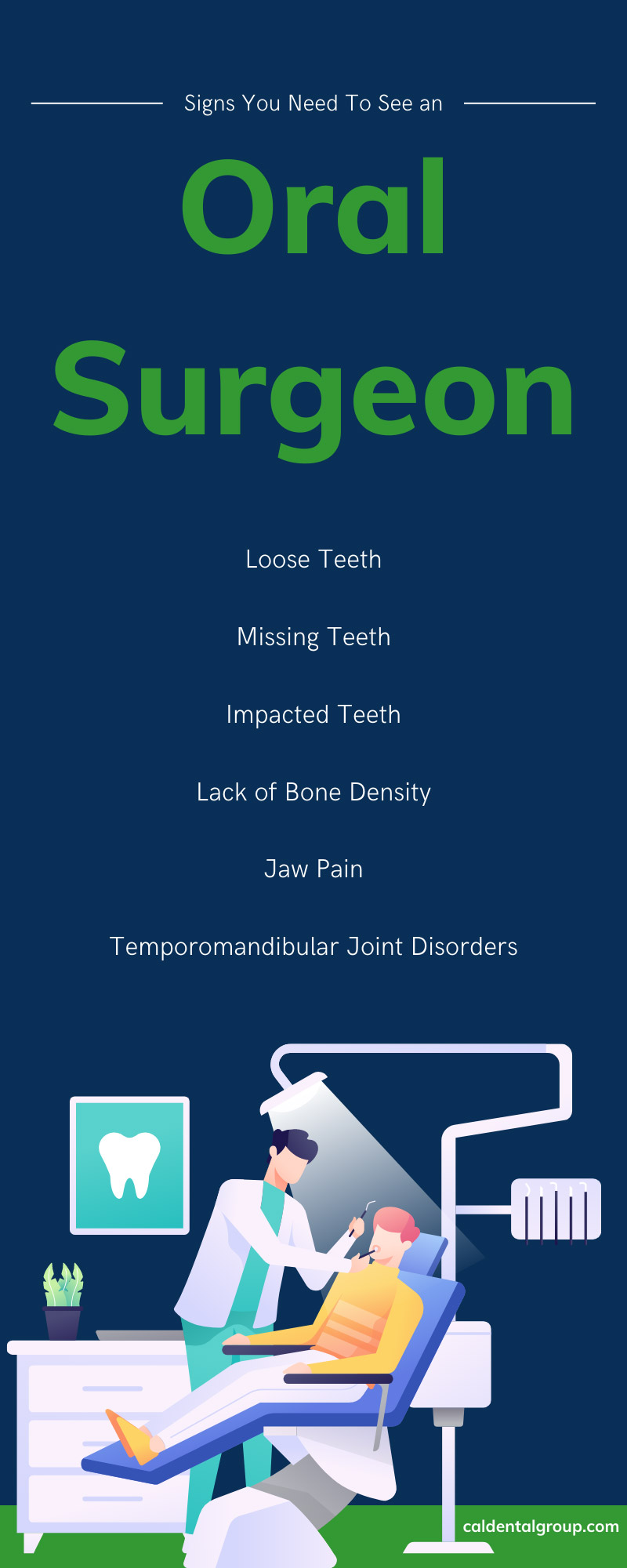A lot of the most significant reasons you might need dental surgery come with nasty pain. Whether you get a twinge of pain when you bite or a jolt when you open your mouth, it’s clear that you should see an oral surgeon. However, not every oral health problem comes with a big flashing warning sign.
We’re here to tell you all the signs you need to see an oral surgeon, whether they come with discomfort or not. Read on to learn when you should make an appointment to see your oral surgeon!
Loose Teeth
Loose teeth are never a good thing (once you’re over the age of 13). However, a talented oral surgeon can decipher and address the root causes of loose teeth in no time flat—it’s one of their specialties!
What will your dentist look for when you come in with loose teeth? The dentist will analyze both the bone density and the amount of bone to determine whether you’re a candidate for bridges, dentures, or dental implants. They’re looking for bone health and a lack of infection to approve you for these surgical options.
Your best bet is often dental implants, as they provide a permanent and stable solution for loose teeth.
Missing Teeth
We recommend making an appointment immediately if you have missing teeth. It doesn’t matter if you’ve been without these teeth for a few minutes or a few years—it’s important to see an oral surgeon as soon as possible. Missing teeth cause a host of problems, from personal issues like trouble speaking and low self-confidence to serious risks to your oral health.
For instance, missing one tooth can cause problems for surrounding teeth and make you more likely to develop gum disease. As with loose teeth, implants are a great solution to missing teeth. Keep in mind that permanent solutions are always preferable to temporary ones.
Impacted Teeth
Impacted teeth are no fun at all. This problem occurs when your teeth become stuck—they want to break free of your gums, but they can’t seem to make it happen. Often, they get stuck on other teeth and can only push up halfway. Unfortunately, this half-push can cause problems with the alignment of your other teeth. Most of the time, the best option is removal.
Wisdom Teeth
Wisdom teeth are often the culprits when it comes to tooth impaction. They’re also difficult to clean and come with no benefits for most people. Unless you’re one of the lucky few whose wisdom teeth come in with no problems, the right move is probably to remove them before they cause crowding, infection, or discomfort.
Most people have their wisdom teeth removed by their early 20s, but you can get the surgery later if needed.
Lack of Bone Density
What if you don’t have sufficient bone density for implants? Don’t worry—there’s a procedure to help you with that too! If there isn’t enough bone in your jaw to facilitate a dental implant, your oral surgeon can do a bone graft to build your jawbone before you get your implants.
It will take some time for the grafted bone to fuse, but once it does, you can begin the standard process of receiving dental implants.
Jaw Pain
Jaw pain and misalignment go hand in hand. When you notice your underbite or overbite getting worse or you spot some crooked teeth, it may be time to make an appointment to see an oral surgeon.
Orthodontic appliances can sometimes fix your jaw pain, but oral surgery is often the answer. Jaw surgery isn’t something you should put off if you need it. Connect with your oral surgeon and determine if your misalignment is severe enough to necessitate surgery.
Temporomandibular Joint Disorders
Temporomandibular joint problems, commonly referred to as TMJ disorders, are a source of frequent visits to oral surgeons all over the country. TMJ disorders come with nasty pain and severe headaches, and relief cannot come soon enough. Some folks can manage the pain with splints, physical therapy, and medication, while others need surgery to truly fix the problem.
Contact your oral surgeon today to find out which treatment is right for you.
Facial Infections
Facial infections can cause persistent pain that overtakes your life. When swelling reaches a point where it’s difficult to function, oral surgery can step in and help. You may have an infection or another problem to address—and make sure you handle it soon. Infections can quickly turn into something more serious, so get in touch with your oral surgeon as soon as possible.
Sleeping Concerns
You probably didn’t know that seeing an oral surgeon could relieve some sleeping and breathing problems! It’s true—common problems like sleep apnea normally treated by CPAP and BIPAP machines are something an oral surgeon can help you address. When your partner has to wake you up to get you to stop snoring so they can get some rest, consider making an appointment to see an oral surgeon.
Laser surgery or soft tissue removal can help in a big way to reduce your sleeping and breathing problems.
There’s No Need To Worry
We completely understand that all these things are scary. Seeing the dentist for a normal checkup is enough to inspire dread in most people, and we get it! That’s why Cal Dental Group is committed to your comfort. We work with professionals trained in making you feel comfortable throughout every step of your visit. From the waiting room to the dental clinic, we want to help you feel at ease.
Come in and meet us—we’re always here to serve you.
What Should You Do?
Good news! The next step is simple: contact a great oral surgeon in Los Angeles and make an appointment. The team at Cal Dental Group is here to help—we’re looking forward to meeting you!
Now that you know some of the signs that you need to see an oral surgeon, remember to make an appointment if you’re experiencing any of these issues. After all, it’s better to catch oral health problems early before they turn into something worse.


